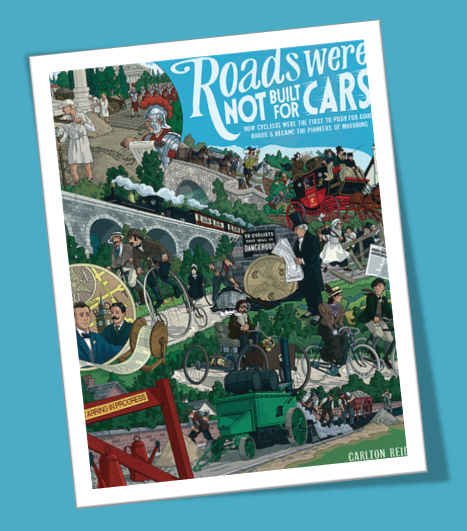
Book Review – Roads were not built for cars
“Essential reading for anyone with an interest in cycling advocacy!”
Anyone wanting a comprehensive review of how our roads entered what we might call the “modern era” should look no further than this highly enjoyable read from British cycling journalist Carlton Reid, interviewed by ECF during the book’s early development in 2011. He has taken an investigation of the role cycling played in road modernisation in the late 19th and early 20th century and extended it to cover the origins of street design, road construction, the engineering of cars and how this period of change was influenced by politics, business and social class.
This is also very much a book for campaigners. It is the most thorough examination I have read of how the battles for influence were fought by cyclists and motorists across the Victorian and Edwardian period, particularly in the UK and the USA. From a modern perspective we might assume that these were battles between driving and cycling lobbies but the book is fastidious in showing that for much of this period these were often the same people fighting to improve the roads for both modes of travel.
But Carlton is happy to call himself a revisionist. He does have a clear mission in this story. This book wants to reclaim a piece of history on behalf of cycling, correcting the way that the motoring lobby subsequently grabbed the road space and made it a “space for cars”, especially Henry Ford’s later claim that it was the motorists that created modern roads. This makes the book essential reading for modern campaigners who are challenging some of the attitudes and values from that period almost 100 years later. For many ECF members and supporters we can trace our roots back to those early campaigners in the Cyclists’ Touring Club (today’s CTC) and the League of American Wheelmen.
The great pleasure of the book is that the reader can almost sense Carlton digging away in libraries and on line and uncovering gems that he just had to share. The role of cycling in the design and manufacture of early cars. The business tactics of the early cycling and motoring companies. He is particularly good at discussing the personalities of the period and their influences from pioneer roads campaigners like Rees Jeffreys to businessman Henry Lawson. There is a whole chapter on ten of the key names where one can sense the journalist in Carlton almost interviewing them to find out their cycling origins and how it influenced their careers.
This book must be regarded as essential reading for anyone with an interest in cycling advocacy even if it is mainly focussed on the UK and the USA. Perhaps it leaves the door open for new chapters from contributors in other countries to add their story in later editions.
To buy an electronic copy of “Roads Were Not Built for Cars” go to the book’s website.
More book reviews by ECF
“Cures for Ailing Organizations” acts as a guidebook for organisations hindered by problems common to the non-for-profit-sector.
“Cyclists & Cycling Around the World” is an inspiring literary contribution to the development of cycle-friendly cities throughout the whole world featuring contributions from 25 cycling experts including leaders of ECF organisations.
And on a lighter note try riding a whole Eurovelo route with “Along the Med on a bike called Reggie”, one man’s 6000km and 10 country ride across Europe, reviewed here.
Contact the author
Recent news!
Upcoming events
Contact Us
Avenue des Arts, 7-8
Postal address: Rue de la Charité, 22
1210 Brussels, Belgium










